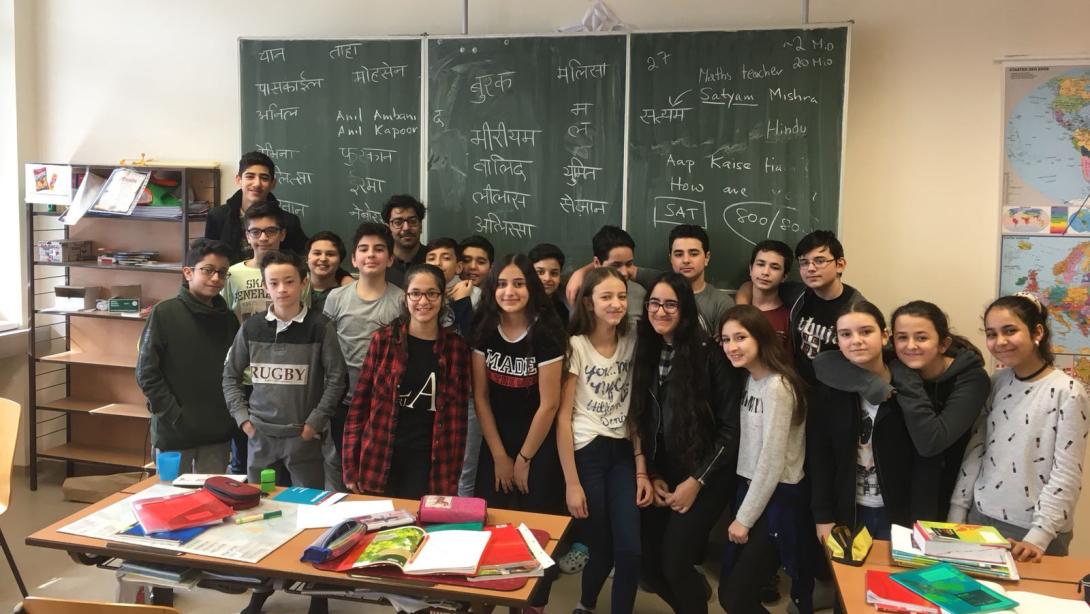Lessons of Hope from a Global Classroom

“Now that Bombay is called Mumbai, why wasn’t Bollywood renamed as well?”
“Why did Hitler use an Indian symbol for the Nazi party?”
These were just a few of the interesting and extremely intelligent questions I was posed by a class of very well informed students I recently visited. What was especially surprising about the quality of the questions was the fact that these were students studying in Vienna, Austria who haven’t had much direct contact with Indians but still knew a lot about my country. The group of 14-to-15-year-olds included not just Austrians, but children who had come to Austria as refugees from countries including Iraq, Afghanistan, Chechnya, Bosnia, Turkey, Serbia, Kurdistan, and Pakistan. All of them were learning together in the classroom of my friend Matthias Stiedl, a Teach For Austria fellow who hosted me in his home while I visited Austria for the Vienna Calling conference.
Vienna Calling — which was completely organized by Teach For Austria fellows - brought together 60 teachers from 15 different countries from around the world. As an alumnus of Teach For India, I was excited for the opportunity not just to learn from other teachers but also from the students they taught, and so when Matthias suggested I visit his English class in order to help his students learn more about Indian culture I jumped at the chance.
I did not know then what I was in for.
Matthias’ class was brilliant in every which way — be it discipline, awareness or their desire to explore and learn about other cultures. Here are some of the incredible students I met and their inspiring stories:
Born in Iraqi Kurdistan, Zaniar wants to be a policeman. For the nine years he lived in the city of Erbil in Iraq he saw chaos and conflict and told me about “the worst years” when his father had to leave the rest of his family behind and struggle for four years before they could be reunited.
Like many teenagers, Woleed wants to be an architect, though perhaps unlike most, his dream architecture project is to help rebuild his hometown of Mosul, Iraq. He lived for a decade in Iraq before moving to Austria and would someday like to welcome his Austrian friends to his home city. His classmate and friend, Mohsen, would be his first guest.
Mohsen hails from Afghanistan and lived in the Iranian city of Mahssad for a decade. He gets upset when he recounts how his father had to leave his business of trading shoes after being threatened because he wasn’t Iranian. He told me what he loves the most about his school is that the kids aren't hit by teachers.
War has displaced a lot of Matthias’s students’ families. Fariza and Aishat’s parents all fled Chechnya for Austria during the war. Both girls want to fight against the ‘unwritten’ rules that exist for women in society and said that education was the most powerful tool to do so — something I completely agree with!
Tarik from Bosnia and Sezan and Umit from Turkey all made a point to thank their teachers, Matthias in particular, for helping them realize their dreams and most importantly for helping them see the world as a single community. To me, that really reflected an Indian value mentioned in our Sanskrit texts — the value of “Vasudeo Kutumbakam” or “the entire world is my community.” It was beautiful to see this value being lived out in Vienna!
In fact, for me, these kids represent what a global village could actually look like. What amazed me most about them is that although they could have chosen to be pessimistic about a lot of things, they chose happiness and are willing to adapt. They haven't forgotten their roots but are constantly searching for opportunities. Though they may have had to go through difficult times, this only made them determined to chase their dreams and be the agent of change in their own ways.
Zanair, the would-be policeman from Iraqi Kurdistan could have chosen anarchy, but instead he wants to create order.
Woleed, the budding architect, could have chosen destruction, but he dreams of helping to rebuild.
Fariza and Aishat could have just been complacent about the different set of harsher rules that exist for females in their society, but they decided to speak up and not just fight for their own rights but for the rights of all girls.
All of the students could have chosen to be upset, but instead they chose hope! This hopeful attitude was my key takeaway from my time in Matthias’s classroom and I am so glad I had the opportunity to meet these incredible students who are living examples of why we all should continue to have hope for our future.
Learn more about Teach For Austria Fellows and alumni who are working to support refugees.



